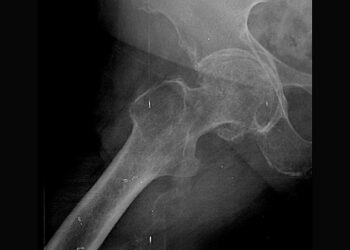The addition of lurbinectedin — a novel alkylating agent and transcription inhibitor — to first-line maintenance immunotherapy for extensive-stage small cell lung cancer (ES-SCLC) improved survival compared with standard maintenance therapy, according to new study results.
IMforte is the first phase 3 trial to show meaningful improvement in both progression-free survival (PFS) and overall survival (OS) with first-line maintenance treatment in ES-SCLC, “highlighting the potential of lurbinectedin plus atezolizumab to become a new standard of care in this patient population…particularly considering this aggressive and difficult to treat disease,” said lead investigator Luis G. Paz Ares, MD, PhD, during a press conference for the American Society of Clinical Oncology (ASCO) 2025 annual meeting.
Paz Ares, chair of the Department of Medical Oncology at 12 de Octubre University Hospital in Madrid, Spain, described the current standard of care for first-line treatment of ES-SCLC. That involves induction therapy with a combination of etoposide, platinum chemotherapy plus either atezolizumab or durvalumab, followed by maintenance therapy with the same immune checkpoint (IC) inhibitor, he said, during the press conference.
“Most of those patients respond to treatment, but response is typically not long-lasting,” he explained, adding that relapse is common after a few months “and second- and third-line treatments are not very effective.”
Previous research has shown lurbinectedin synergizes with IC inhibitors to achieve high rates of tumor regression and induce long-term T-cell memory, he added.
IMforte included 660 treatment naive ES-SCLC patients with no central nervous system metastases into a standard induction treatment of four cycles of atezolizumab plus carboplatin and etoposide.
Those whose disease did not progress after this (n = 483) were eligible for the maintenance phase of the study in which they were randomized to either a control group of standard therapy with atezolizumab (1200 mg intravenous [IV] every 3 weeks), or the experimental group with both atezolizumab plus lurbinectedin (3.2 mg/m2 IV every 3 weeks).
Follow-up was until disease progression or unacceptable toxicity, with primary endpoints being independent review facility–assessed PFS and OS.
The study showed a “clear and significant improvement” in PFS for patients treated with the experimental therapy, with a median PFS of 5.4 months compared with only 2.1 months in the control group (hazard ratio [HR], 0.54; P <.0001). This corresponded to 6-month and 12-month PFS rates of 41.2% and 20.5% in the experimental group compared with 18.7% and 12% in the control group.
Similar improvements were seen for OS, with a median of 13.2 in the experimental group vs 10.6 months in the control group (HR, 0.73; P =.0174), and 12-month OS rates were 56.3% and 44.1%, respectively.
There was “a predictable” safety profile for patients in the experimental group, with an expected increase in side-effects, but no new safety signals, Paz Ares said.
Treatment-related grade 3/4 adverse events (AEs) occurred in 25.6% of those in the experimental treatment group compared with 5.8% of those in the control group, and treatment-related grade 5 AEs were seen in 0.8% vs 0.4%. The percentage of patients requiring discontinuation because of AEs was 6.2% vs 3.3%.
Commenting on the results, Charu Aggarwal, MD, professor for lung cancer excellence at the Perelman School of Medicine, University of Pennsylvania, Philadelphia, who was not involved in the study, said while immunotherapy has improved survival outcomes for this patient population “long-term outcomes remain suboptimal, underscoring the need for better strategies.”
The integration of lurbinectedin alongside atezolizumab following initial chemo-immunotherapy “represents an important next step,” she added. “This approach offers a way to extend disease control and may signal a shift toward more durable benefit for patients.”
ASCO Chief Medical Officer and Spokesperson Judy Gralow, MD, noted that while lurbinectedin is currently US Food and Drug Administration approved in the second-line maintenance setting, “with the results of this study, we would anticipate that it would be moved into the first-line maintenance setting.”
However, she emphasized that even with this change, PFS was “still quite low” in both groups of the study. “We need to work on additional ways of advancing this even further. So it is a small next step. It is extending the time that the tumor doesn’t progress and the amount of time that the patients are living. But we need to do more research in extensive stage small cell lung cancer as well.”
Paz Ares disclosed leadership and stock and other ownership with Altum Sequencing and Stab Therapeutics; honoraria from Abbvie, Amgen, AstraZeneca, Bayer, BeiGene, Boehringer Ingelheim, Bristol-Myers Squibb, Daiichi Sankyo, Gilead Sciences, GlaxoSmithKline, Janssen, Lilly, Medscape, Merck Serono, MSD, Novartis, Pfizer, PharmaMar, Regeneron, Roche/Genentech, Sanofi, and Takeda; consulting or advisory roles with Abbvie, Amgen, Astellas Pharma, AstraZeneca, Bayer, BMS, GlaxoSmithKline, Janssen, Lilly, Merck, Mirati Therapeutics, MSD, Novartis, Pfizer, Pharmamar, Regeneron, Roche, Sanofi; and Takeda; speakers’ bureauwithAmgen, AstraZeneca, BeiGene, BMS, Daiichi Sankyo Europe GmbH, Lilly, Merck Serono, MSD Oncology, Pfizer, and Roche/Genentech; research funding withAstraZeneca, BMS, MSD, Pfizer, and PharmaMar; and other relationships with Amgen, Astellas Pharma, Crinetics Pharmaceuticals, Esteve, HUTCHMED, Ipsen, ITM Isotope Technologies Munich, Merck, Novartis, Pfizer, Roche, Sanofi, and Servier.
Aggarwal made several kinds of disclosures involving various companies. Gralow disclosed no conflicts. The IMforte study was funded by Genentech.
Kate Johnson is a Montreal-based freelance medical journalist who has been writing for more than 30 years about all areas of medicine.
Source link : https://www.medscape.com/viewarticle/adding-lurbinectedin-maintenance-shows-benefit-sclc-2025a1000d7k?src=rss
Author :
Publish date : 2025-05-26 11:12:00
Copyright for syndicated content belongs to the linked Source.














